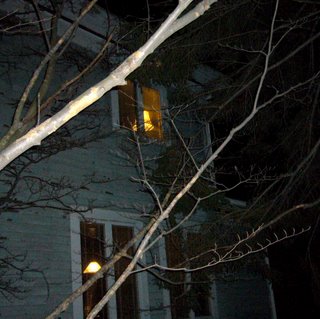Shades of Wakefield
 Looking in other people's windows at night is, I think, universally interesting. For just this reason, savvy homemakers create a fetching display for the picture window and leave the drapes open all the time. The loveliest vase or lamp is centered on the Duncan Phyfe table, and framed by artfully tied back lace panels; the Christmas tree is proudly showcased in the front parlor. Since I was a little girl, I've loved to walk at night, getting glimpses of other people's lives framed by windows or an open doorway.
Looking in other people's windows at night is, I think, universally interesting. For just this reason, savvy homemakers create a fetching display for the picture window and leave the drapes open all the time. The loveliest vase or lamp is centered on the Duncan Phyfe table, and framed by artfully tied back lace panels; the Christmas tree is proudly showcased in the front parlor. Since I was a little girl, I've loved to walk at night, getting glimpses of other people's lives framed by windows or an open doorway.Looking in your own window is something else again. Hawthorne captured the creepy feeling of displacement perfectly in his tale "Wakefield," one of my favorite short stories. It's about a man possessed "of a quiet selfishness...of a peculiar sort of vanity...of a disposition to craft which had seldom produced more positive effects than the keeping of petty secrets, hardly worth revealing; and, lastly, of...a little strangeness....this latter quality is indefinable, and perhaps non-existent." Wakefield goes out one day, telling his wife he'll be gone for a night or perhaps three or four. He takes lodgings one street away from his own home, and spies on his wife for twenty years before nonchalantly stepping back in the door one night, simply because it's raining and the firelit scene inside looks so inviting.
"This happy event--supposing it to be such--could only have occurred at an unpremeditated moment," concludes Hawthorne's narrator. "We will not follow our friend across the threshold. He has left us much food for thought, a portion of which shall lend its wisdom to a moral, and be shaped into a figure. Amid the seeming confusion of our mysterious world, individuals are so nicely adjusted to a system, and systems to one another and to a whole, that, by stepping aside for a moment, a man exposes himself to a fearful risk of losing his place forever. Like Wakefield, he may become, as it were, the Outcast of the Universe."
Heavy stuff. And, considering that it was published in 1837, startlingly modern. Wakefield is a predecessor of Bartleby, of Pym, of Meursault, of Roquentin, of K., of every twentieth-century antihero afflicted by alienation, perversity, irrationality, and compulsion.
I look into my own lighted windows every night when I go outside to walk my dog. I walk around the block with her, and then I go back inside. But always, for a fleeting second, I think what it would be like just to walk away, to drop out and lose my place in the system forever.


0 Comments:
Post a Comment
<< Home